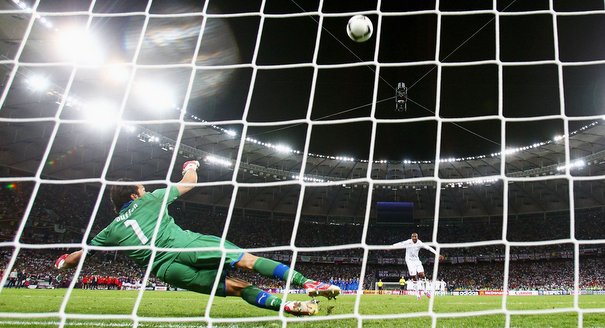Over the past few weeks, Ukraine has felt like a safe, happy, and hopeful country once again, like in the good old times of the Orange revolution.
EURO 2012, which Ukraine is co-hosting with Poland, is going well. Teams have enjoyed their games, despite the occasionally stormy weather and inattentive referees. There were no clashes between rival football fans in Ukraine. Ukrainians proved to be great hosts and, despite difficulties with official accommodation and train tickets, Europeans were excited about their trips. European media upgraded Ukraine from “dangerous” and “unsafe”, to “attractive” and “hopeful”.
The tournament will soon be over though, and so, unfortunately, may Ukraine’s cheerful period. The country will return to its reality—life or death political struggles in the buildup to the October parliamentary elections, a poor business climate, and attacks on the media. Meanwhile, the European Union will have little time for its neighbor to the east, focusing on saving the euro and the Union itself.
There are, however, a few lessons to be learnt from this period.
Lesson 1: Ukraine is a Good Place—for Traveling and for Making Good Friends.
Look at all pictures posted by European fans and their Ukrainian friends. Read all the comments of truly excited people. Ukrainians managed to make their country comfortable for people they hardly knew despite their own difficulties.
The sad news is that it may not last long. Unfortunately, Ukrainians are unable to take as good care of themselves as of their guests. When they return to reality, they will vote with their stomachs—or hearts—not brains. Once again, when elections come around in October, they are unlikely to be able to articulate what they want from their politicians.
Lesson 2: Ukrainians Need Hope and Positive Emotions.
EURO 2012 provided many Ukrainians with a happy distraction from their daily struggles. Football proved to be a good reason to break from political debates and worries about families’ futures. Successes by their team returned Ukrainians’ pride, and brought back a certain sense of unity.
But now Ukrainians will go back to their kitchens to complain about life and politicians. They are unlikely to stand up for their right to prolong these feelings. I do not mean uniting against a certain judge, or against UEFA by sending around pictures of a goal that should have been, as many, including me, did right after Ukraine’s match against England. Ukrainians will again accept their reality. They will hardly even complain about the authorities’ misuse of state funds for the tournament.
Lesson 3: Ukraine Remains a Mystery to Europe.
Despite the Orange revolution, and other events of the past few years, many European fans did not have any idea where Ukraine is or what it is about. I wonder where all the millions of hryvnias dedicated to promoting Ukraine went. Numerous fans listened to European media and did not dare to come. Those who did were surprised by the hospitality and positive attitude of ordinary Ukrainians.
However, the interest may fade away after a short while. The Ukrainian authorities will be happy to supply European media with new negative stories. To recover from that, Ukraine may need to bid for the next Olympic games or something of that sort.
Lesson 4: European Media was Biased and Negative, for all the Wrong Reasons.
European media focused on stray dogs being killed to clean up for the tournament, or Ukrainian chauvinism. While both cases deserve condemnation, their severity was overstated and they are certainly not Ukraine’s biggest problem. Nobody wrote about Ukrainians disagreeing with the course of affairs in their country. Nobody showed how much Ukrainians did to make European fans feel at home.
Some western media picked up on that later. There were a few positive articles, such as this one in Financial Times. But will the rest of the media follow?
Lesson 5: The EU Boycott of Games in Ukraine Failed.
EU politicians announced their boycott long before the tournament. Their message was patchy, and reached neither the authorities nor the public. The pause in Ukrainian political life during the tournament does not mean that problems will not resume once the games are over. And despite their lack of interest in the visits of EU leaders, ordinary Ukrainians did not appreciate being put in the same basket as their government.
European leaders were right not to come to Kyiv or Donetsk to share the VIP lounges with their Ukrainian counterparts. However, they could have used the opportunity to visit Ukraine, reach out to ordinary people, and try to articulate their message more clearly. And by no means should they have fed the minds of those who accused them of double standards, or of vagueness in their commitment to their values, by promising to come to Ukraine if their team would make it to the tournament’s final.




-1.png)

-1.png)